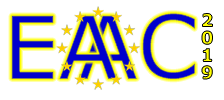Speaker
Description
We theorerically demonstrate a possibility to resonantly accelerate electrons by a moderately relativistic laser pulse (from $\sim 10^{19}-10^{20}$ W/cm${}^2$) interacting with the surface of a microstructured target with periodic grooves. If the structure period is equal to the laser wavelength, a resonant acceleration may occur and electron bunches can be accelerated up to high energies by the laser electric field component in the direction of grooves. Due to the presence of the microstructure, the relativistic electrons feel only the forward component of the field during the acceleration process, which allows for achieving energies up to hundreds of MeVs even for moderately relativistic field amplitudes $a_0 \sim 10$.
A one-dimensional model allows for determining the condition for electron capture by the field structure and infinite acceleration.
Also, three-dimensional PIC simulations demonstrate the feasibility of the considered acceleration process in more realistic situations. The effects of oblique incidence and the laser polarization direction with respect to the groove direction on the acceleration process are also studied.
Also, it is shown that with increasing laser intensity, the structured target also becomes an efficient source of synchrotron gamma-rays.

